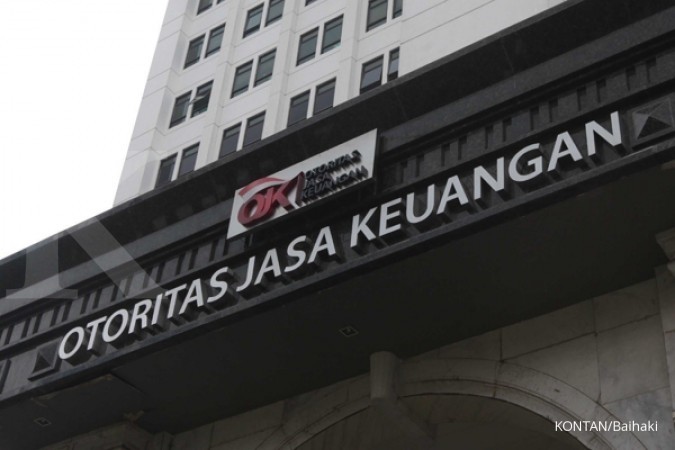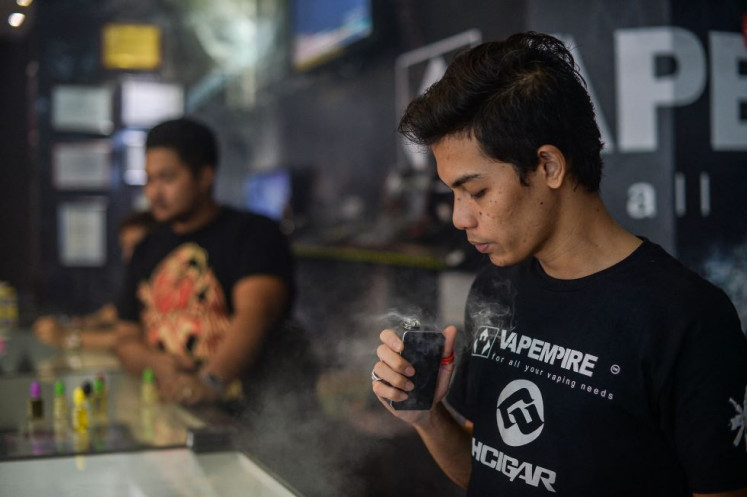OJK policy will usher in healthier market
In the past, OJK has sanctioned and revoked licenses of securities companies with compliance issues or internal control and management issues. OJK issued several regulations to address these conditions previously: In 2012, a revised regulation on the net adjusted working capital (MKDB); in 2014, a regulation on the Know Your Customer principles for securities companies and banks and a circular letter on internal control for broker-dealer; and in 2015-2016, regulations on the licensing of underwriter and broker-dealer representatives.
These existing regulations aim for better internal control and management of securities companies to enhance protection to investors and the securities market.
Change Size
 This picture shows the front of the Financial Services Authority (OJK) building. The OJK will support Bank Indonesia's efforts to reduce the interest rate over the year. (KONTAN/*)
This picture shows the front of the Financial Services Authority (OJK) building. The OJK will support Bank Indonesia's efforts to reduce the interest rate over the year. (KONTAN/*)
T
he Financial Services Authority (OJK) regulation No. 20/POJK.04/2016 (Regulation 20 ) on the licensing of securities companies conducting underwriter and broker-dealer activities (securities companies) effective as from April 2016 introduced significant changes compared to the previous regulation on this matter.
A number of changes impact on ownership of securities companies. Before Regulation 20, there was no restriction on shareholders of a securities company obtaining financing from another party to fund their capital injection in a securities company.
This is now prohibited and all existing shareholders need to comply by no later than 18 April 2017 (though noncontrolling shareholders of a listed securities company are exempt).
The phrase “controlling shareholder” now includes a party that directly or indirectly holds 20 percent or more of shares with voting rights, or holds less than 20 percent of such shares but has direct or indirect control. “Control” is now specifically defined to include, among others, a shareholder with (i) 20 percent or more voting rights (individually or jointly), (ii) the ability to appoint or remove a director or (iii) the ability to control the majority vote in a directors meeting.
Previously, this phrase was generally understood to mean a party holding 50 percent or more of shares with voting rights, or having actual control over a securities company.
In relation to corporate ownership, Regulation 20 clarifies that so-called cross share-ownership between two companies is allowed when the securities company acts as an underwriter and standby purchaser, and other specified conditions. Previously there was no clear regulation on this point.
As to foreign ownership, a foreign non-securities company can own up to 85 percent of shares, while foreign securities companies can own up to 99 percent of shares. These limitations do not apply to listed securities companies.
In terms of operation, Regulation 20 enables securities companies to create a more efficient structure by excluding broker-dealer activities from their license and focusing only on underwriting activities.
A securities company can also apply for OJK’s approval to conduct other activities in support to its underwriter and broker-dealer activities. If a securities company excludes broker-dealer related activities from their license, this may in turn enable, among others, significant headcount reduction.
To improve management quality, a fit and proper test (FPT) process will be initiated in respect of any change of shareholder, commissioner and director, or may be initiated occasionally by the OJK. Any proposed shareholder, director or commissioner must not have been convicted for any general crime during the previous 10 years or for any financial crime during the previous 20 years.
As to day to day operations, securities companies must prepare and implement standard operating procedures (if not already in place) and establish policy and procedures for research by their analyst. These requirements are expected to promote better operation and corporate governance implementation.
Other minor changes may need attention logistically, such as the mandatory inclusion of the word “Sekuritas” in the company name, and inclusion of the full company name in the trading logo.
In the past, OJK has sanctioned and revoked licenses of securities companies with compliance issues or internal control and management issues. OJK issued several regulations to address these conditions previously: In 2012, a revised regulation on the net adjusted working capital (MKDB); in 2014, a regulation on the Know Your Customer principles for securities companies and banks and a circular letter on internal control for broker-dealer; and in 2015-2016, regulations on the licensing of underwriter and broker-dealer representatives.
These existing regulations aim for better internal control and management of securities companies to enhance protection to investors and the securities market.
Regulation 20 appears to be a governmental effort to further improve the financial strength, control and management of securities companies by stressing the financial capacity qualification of shareholders and introducing more rigorous qualifications for shareholders and management of Securities Companies.
This is expected to minimize the risk of losses suffered by securities companies and investors, which may have economic impact on the Indonesian capital market as a whole.
In response to Regulation 20, existing shareholders of securities companies may need to make adjustments to ensure that the funds used for capital injection are not borrowed funds. Foreign ownership limitations may not affect locally owned securities companies, but may impact securities companies currently controlled by foreign shareholders.
Adjustments required, such as share transfers or shareholding restructuring, may not be straightforward or will take time to implement.
Existing securities companies will need to undertake an internal review to ensure compliance with this regulation, and to consider any necessary adjustments to their current shareholding, procedures and practices before the compliance window period ends.
With increasing interconnectedness and complexity of financial markets, it has become imperative for securities companies to implement strong gatekeeping rules to maintain the transparency and efficiency of financial markets globally. Credit risk has also caught the attention of regulators worldwide with many countries embroiled in bad debt situations which have implications on markets globally.
Regulation 20/2016 aims to address these issues by implementing new requirements for more comprehensive information about the shareholders, directors and commissioners. Although these regulations may increase the cost of compliance for underwriters and brokers, it would usher in a healthier market over the long haul.
***
The writer is a partner in Witara Cakra Advocates (WCA). The views expressed are his own.
---------------
We are looking for information, opinions, and in-depth analysis from experts or scholars in a variety of fields. We choose articles based on facts or opinions about general news, as well as quality analysis and commentary about Indonesia or international events. Send your piece to community@jakpost.com.








